I knew very little about Doha before I visited, so I was left with quite the sizeable task of keeping myself occupied when my coronavirus-stricken travel plans left me with an eight-day stay in the Qatari capital.
I had originally planned to hang out in Doha for only two days, but that window was extended because I needed to cut short my stay in China, but couldn’t move forward my return flight to Montreal. Meanwhile, a planned side-trip to Kuwait was also scuppered by the fellow Gulf nation’s tightened border controls against anyone who had been in China for the past 14 days.
Even after indulging in some memorable hotel-hopping across the Ritz-Carlton, the JW Marriott, and the W, I still had plenty of time on my hands to explore the city little by little.
Doha is a fast-growing city with grand designs of establishing itself among the world’s elite capitals – and here’s a guide to everything it offers that might tempt you into visiting for yourself.
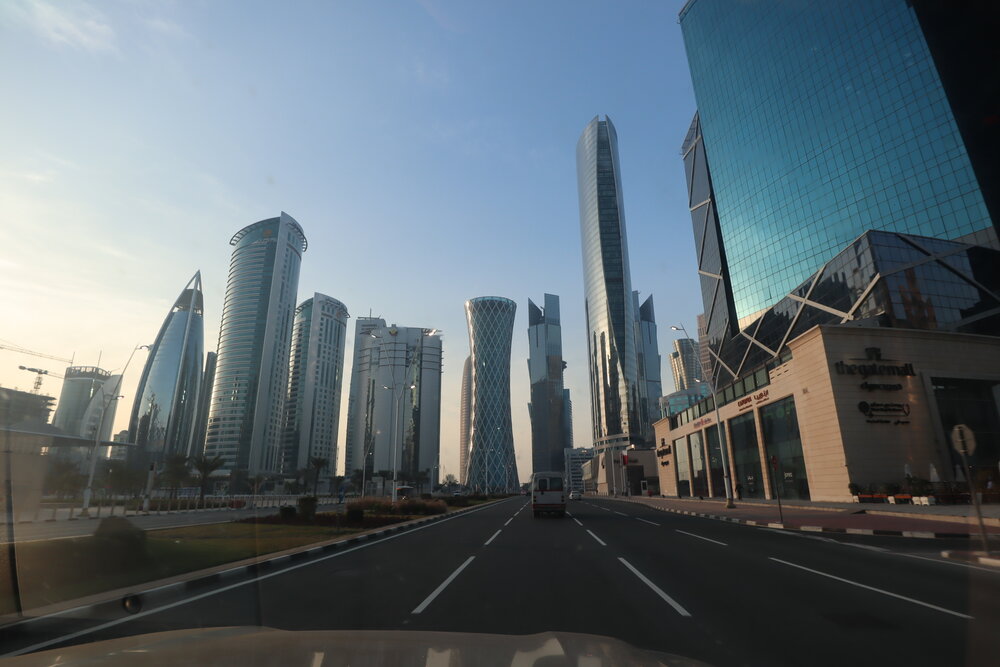
West Bay, Doha
Souq Waqif (Old Souq)
While Doha is a city racing towards the future, as seen in its gleaming West Bay skyline, its star attraction remains on the side of its older heritage: the traditional Souq Waqif, a sprawling marketplace in the central Old Souq district that dates back at least 100 years.
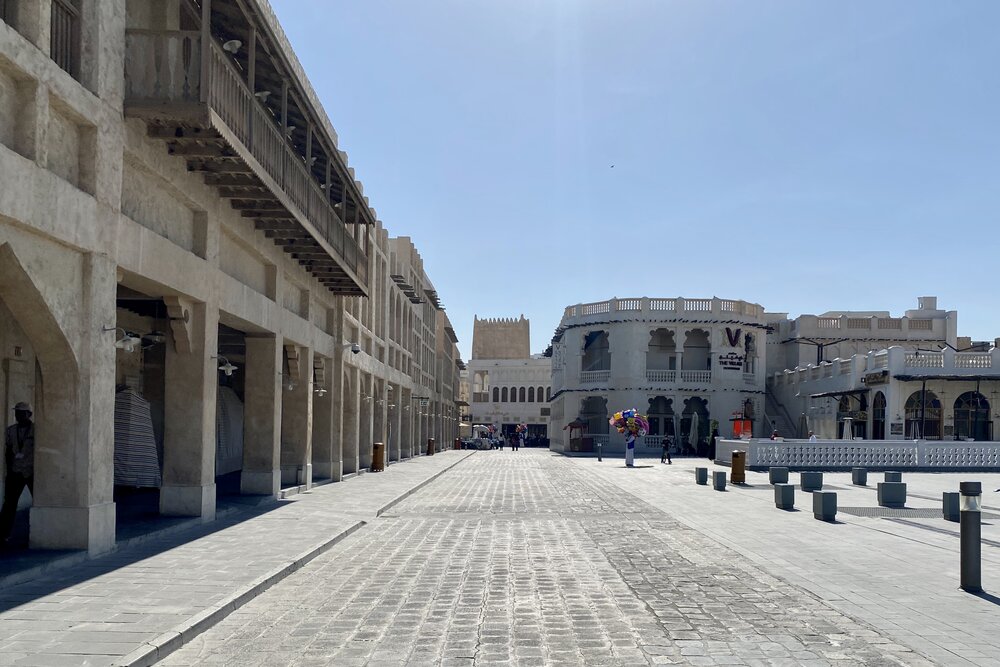
Souq Waqif
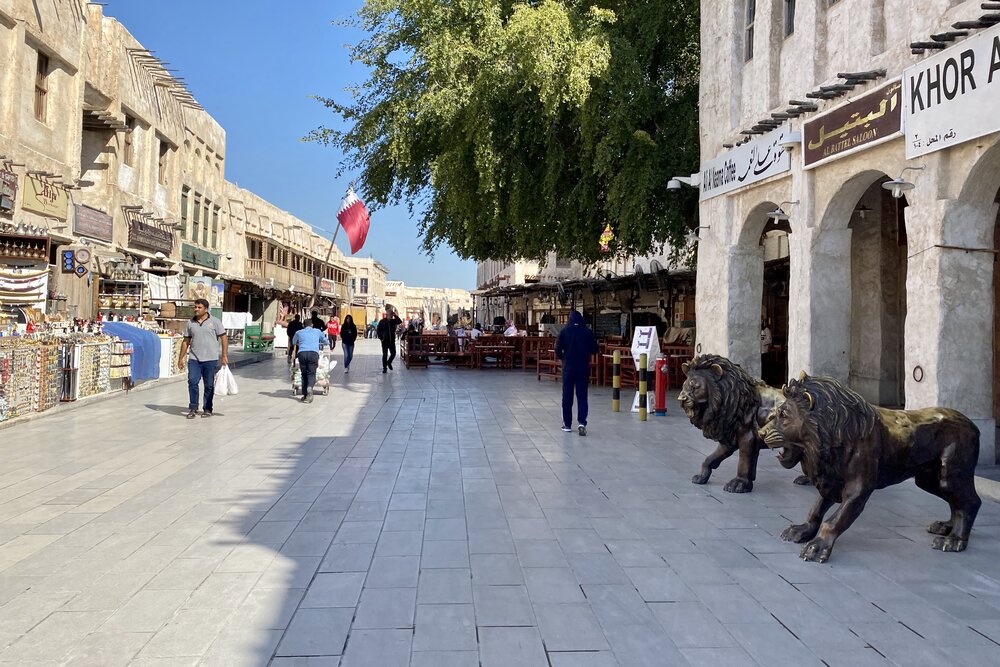
Souq Waqif
Originally the preferred gathering place for Bedouin traders as they passed through the region, today the Souq Waqif is a centre of urban life in Doha, attracting locals, expatriates, and tourists to its patchwork of narrow open-air alleyways.
[foogallery id=”16700″]
Market activity primarily takes place during the day, whereas you’ll find the restaurants, bars, and shisha lounges along the main pedestrian street thrumming with activity by night. No matter how long your stay in Doha, you can’t miss a visit to the old souq.
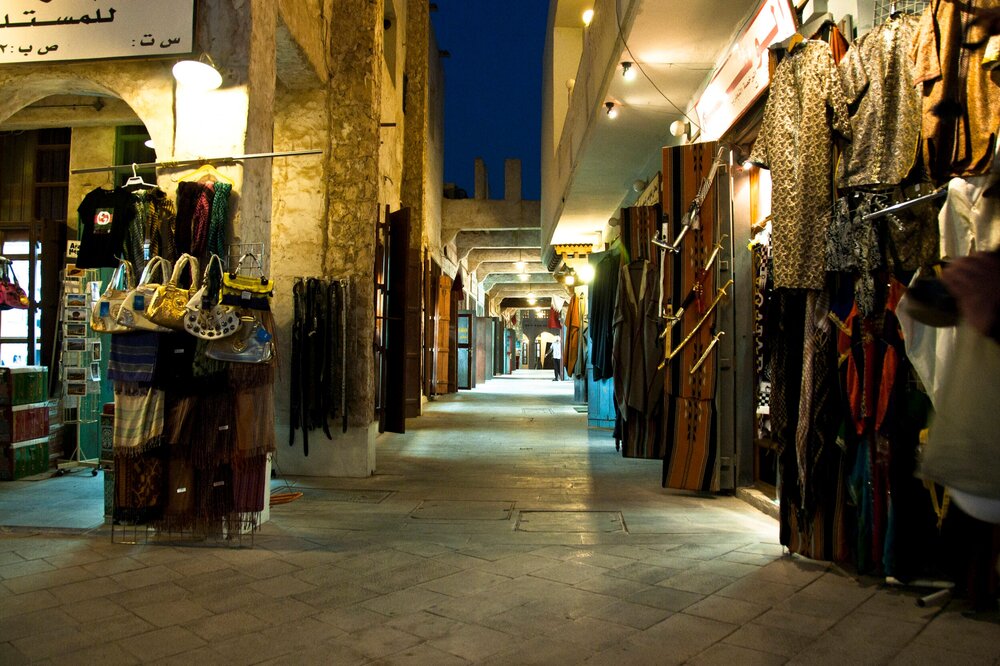
Souq Waqif by night
After picking up some spices or souvenirs, make sure to pay a visit to the falcon souq, which is housed in its own little enclosure on the western side of the market. Amidst the chaos of dozens of squawking birds, hand the shop owner a 5 Qatari Rial note (about $1.83) and he’ll let you snap a photo with the falcon on your hand!
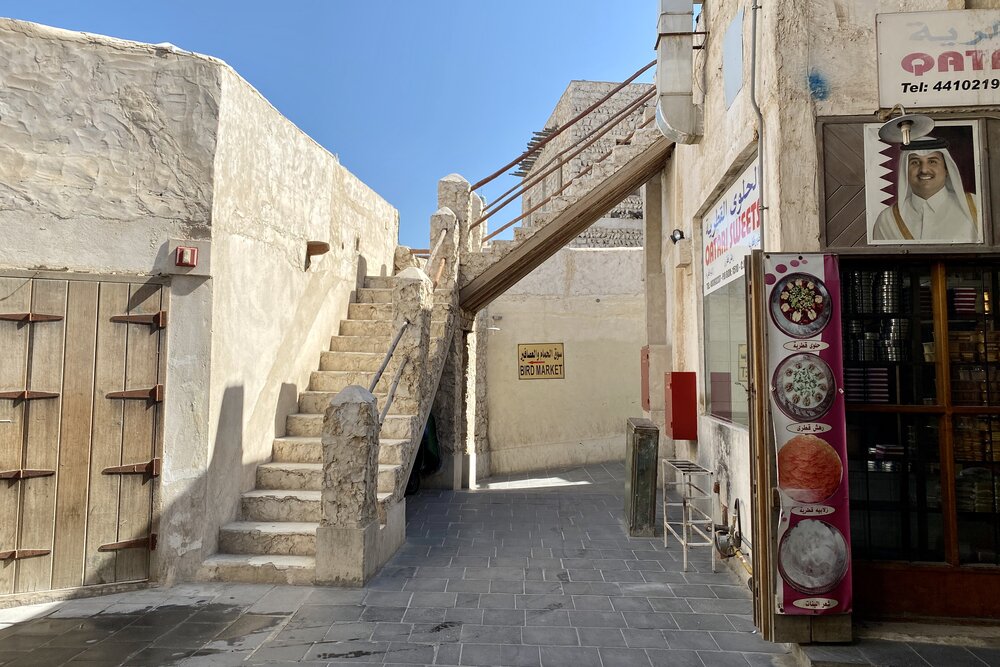
Souq Waqif bird market
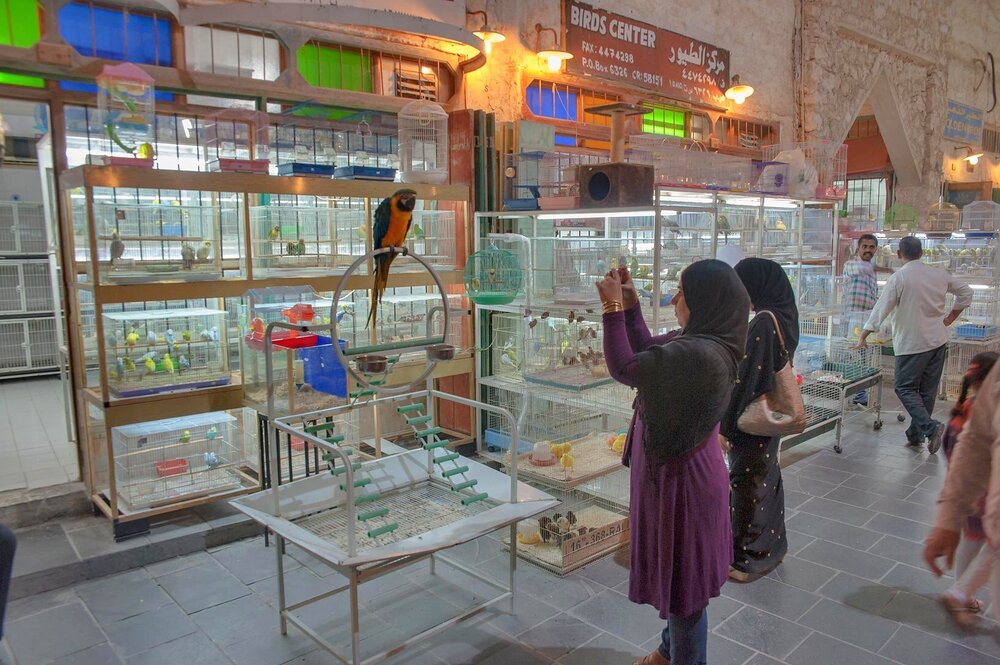
Souq Waqif bird market
And as you make your exit to the roadway to the north, you’ll come across the Pearl Monument right by the water’s edge, a tribute to the pearl-hunting trade that played a key role in propping up the Souq Waqif’s prominence – and indeed of Doha’s economy overall, well before the oil made this place rich – at the turn of the 20th century.
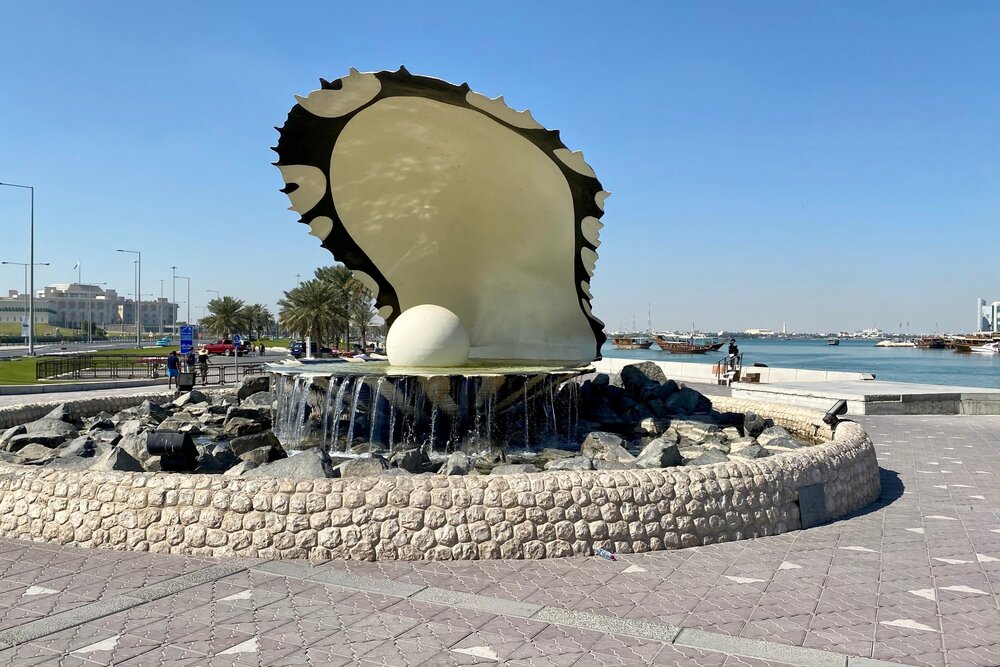
Pearl Monument
Dhow Cruise
Now that you’re at the waterfront, don’t miss the chance to embark on a dhow cruise of Corniche Bay.
Dhows are traditional wooden boats that were used by fishers and pearlers, and their continued presence in the bay represents both a popular tourist activity and a nod to the nation’s seafaring history.
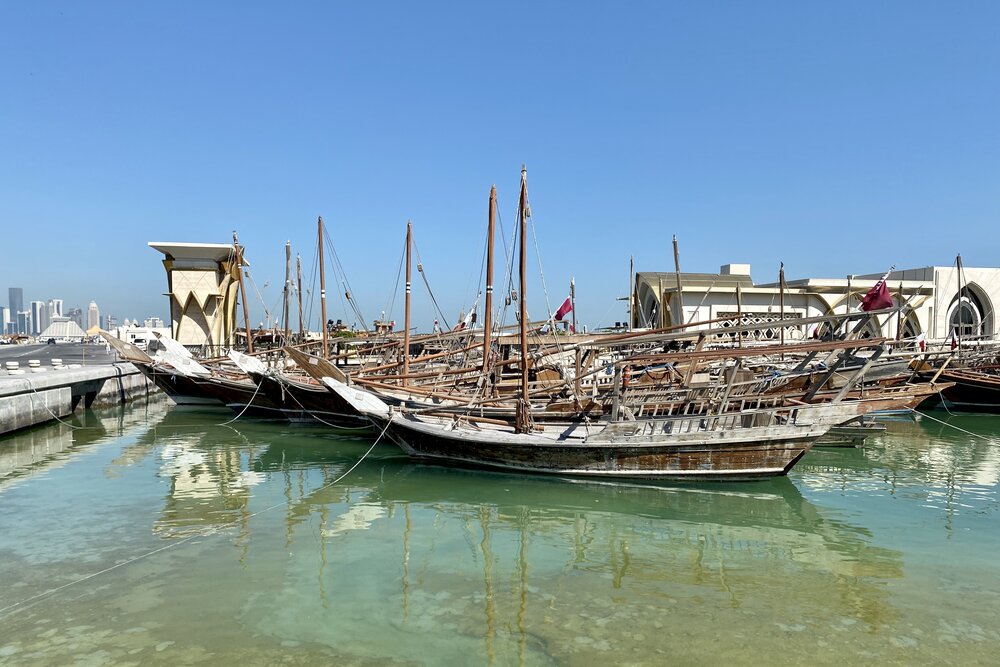
Doha waterfront
There are many comprehensive guided dhow cruises, complete with meals and hotels thrown in, available via tour companies online; however, it can be much simpler to walk up to one of the private boat operators waiting by the harbour and negotiate a price.
I paid 20 QAR ($7.36) for a 30-minute cruise on a dhow that I had all to myself, which was more than enough to take in the views of West Bay from the water.
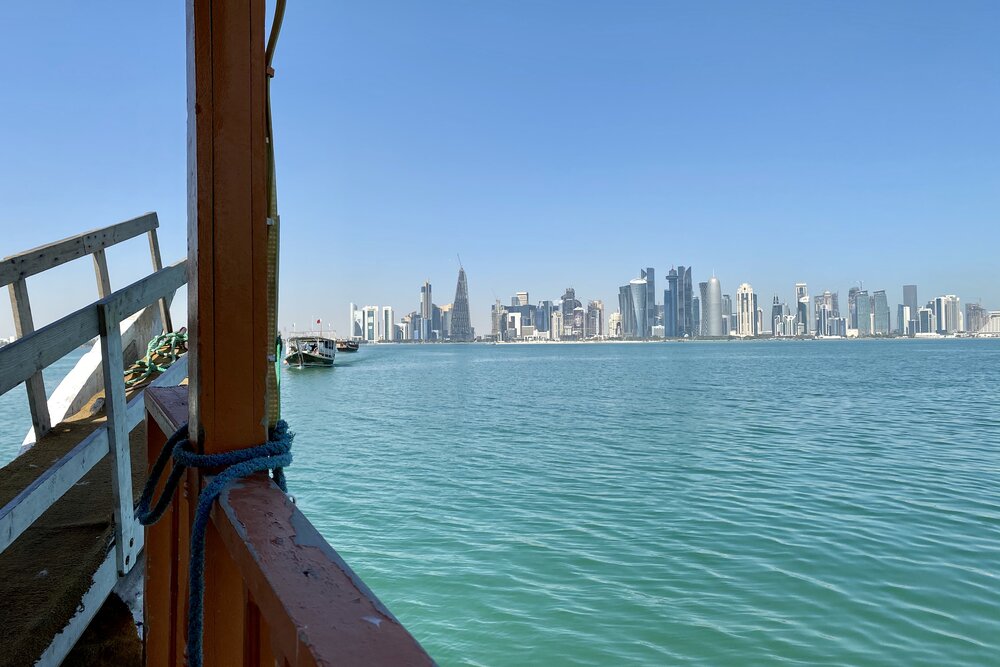
Views of West Bay
The dhow even had a makeshift staircase to reach the roof of the boat, which provided unobstructed views of the skyline.
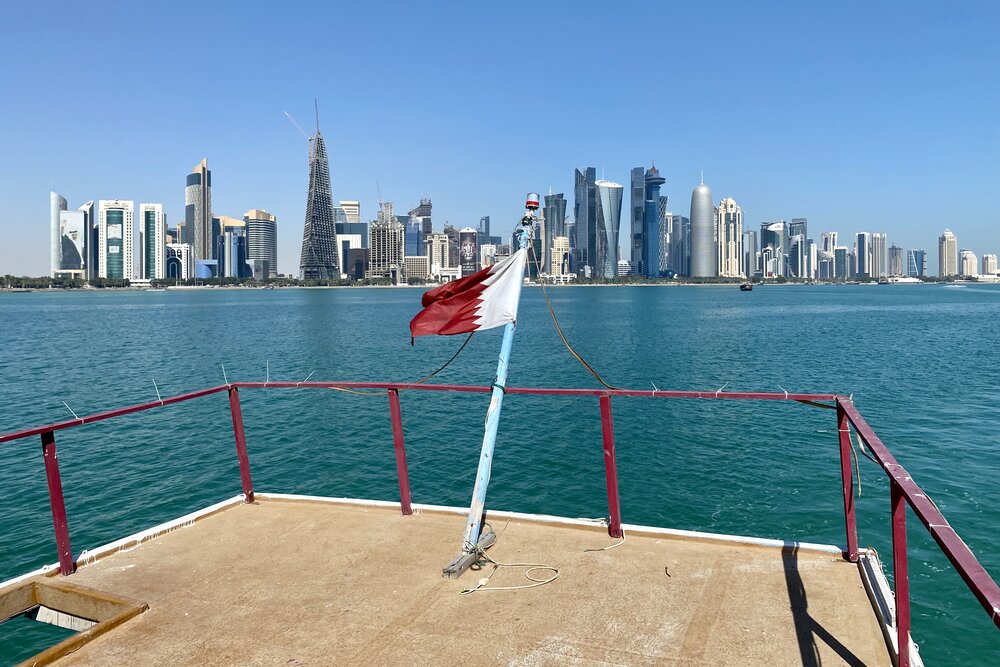
Views of West Bay
Like other oil-rich nations in the Middle East, Qatar does suffer from its fair share of human rights issues: the splendour of the skyline is, in large part, built by labourers from poorer countries in deplorable working conditions.
Indeed, as someone who plans to return to Qatar for the 2022 FIFA World Cup – whose newly-built cutting-edge stadiums have come at the cost of at least dozens, if not hundreds, of deaths of migrant labourers working in the intense heat – there was certainly much to contemplate.
Doha’s Museums
Returning to shore, the Museum of Islamic Art is right next door, although it was closed on the day of my visit. Nevertheless, it’s a striking building to behold from the outside, and I wasn’t surprised to learn that it was designed by IM Pei, the same architect that blessed us with the Louvre pyramid in Paris.
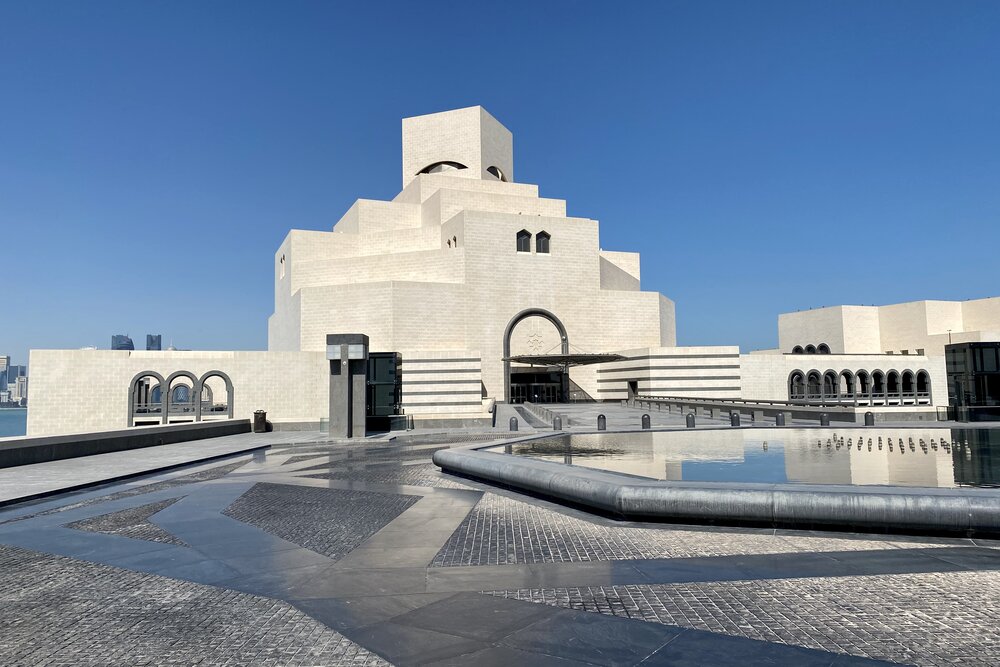
Museum of Islamic Art
The interior collection includes a wide range of textiles, tapestries, ceramics, glasswork, and other art forms from the Islamic world, and based on the handful of museum pieces that I later found showcased in the Qatar Airways Al Safwa First Class Lounge in the airport, I’m sure the museum would’ve made for an engrossing visit.
As someone who generally prefers history over art, I decided to spend some time at the National Museum of Qatar instead. Designed in the image of a desert rose crystal, it certainly ranks among the world’s most beautiful museums, and its exterior is well worth pausing to admire all on its own.
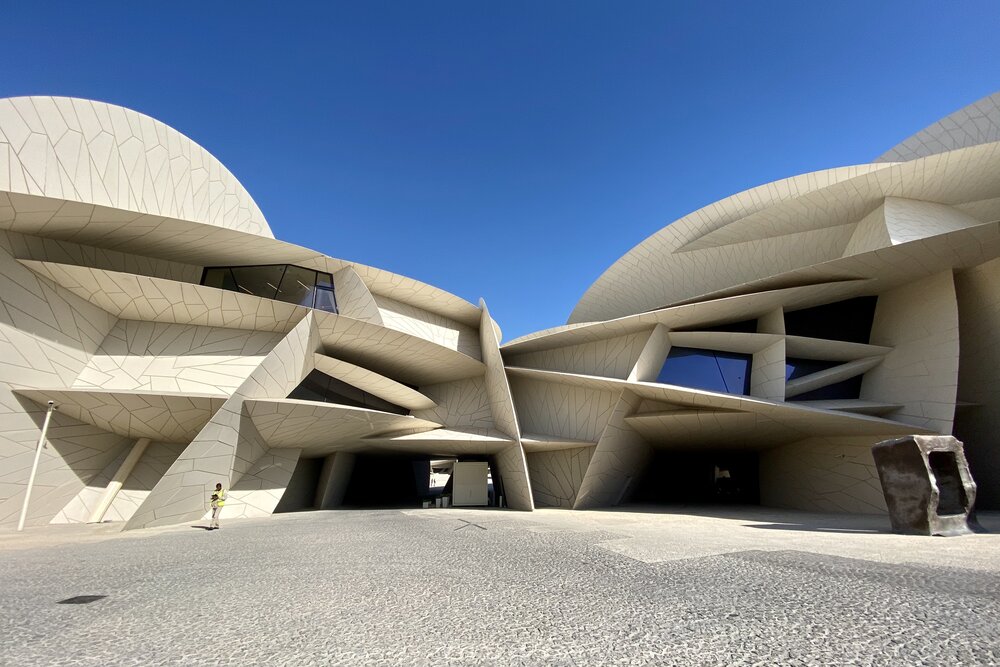
National Museum of Qatar – Exterior
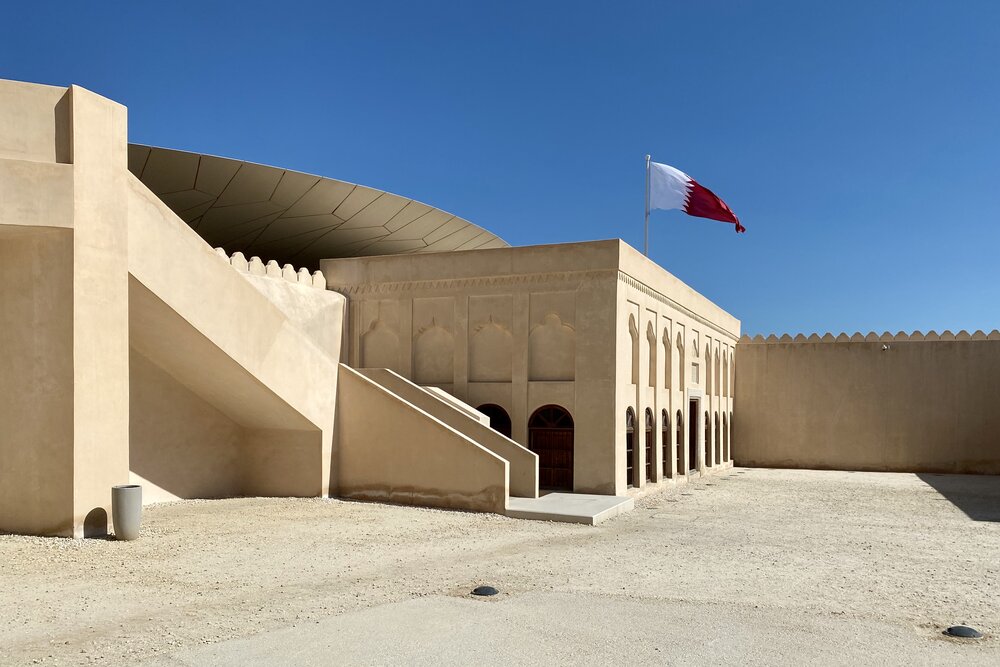
National Museum of Qatar – Exterior
[foogallery id=”16693″]
The museum takes the visitor on a path through Qatar’s history, from the natural history of the Arabian Gulf, through the Bedouin traders that first populated the area, followed by the periods of Ottoman and British rule, and finally to the oil-fuelled wealthy independent nation of Qatar today. The audiovisual exhibits were very impressive, as were the national treasures on display.
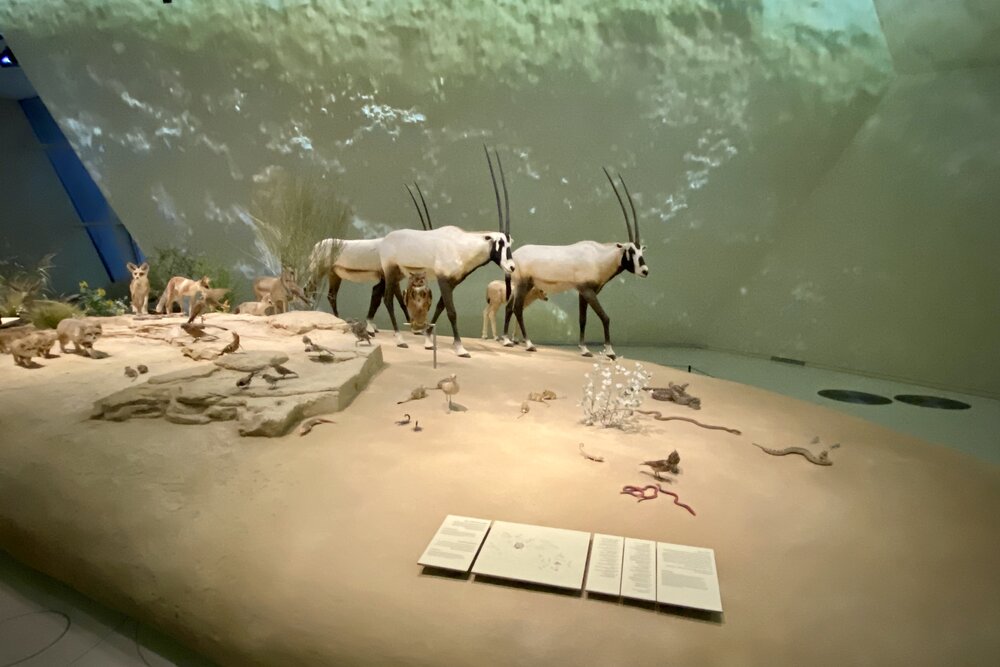
National Museum of Qatar – Exhibits
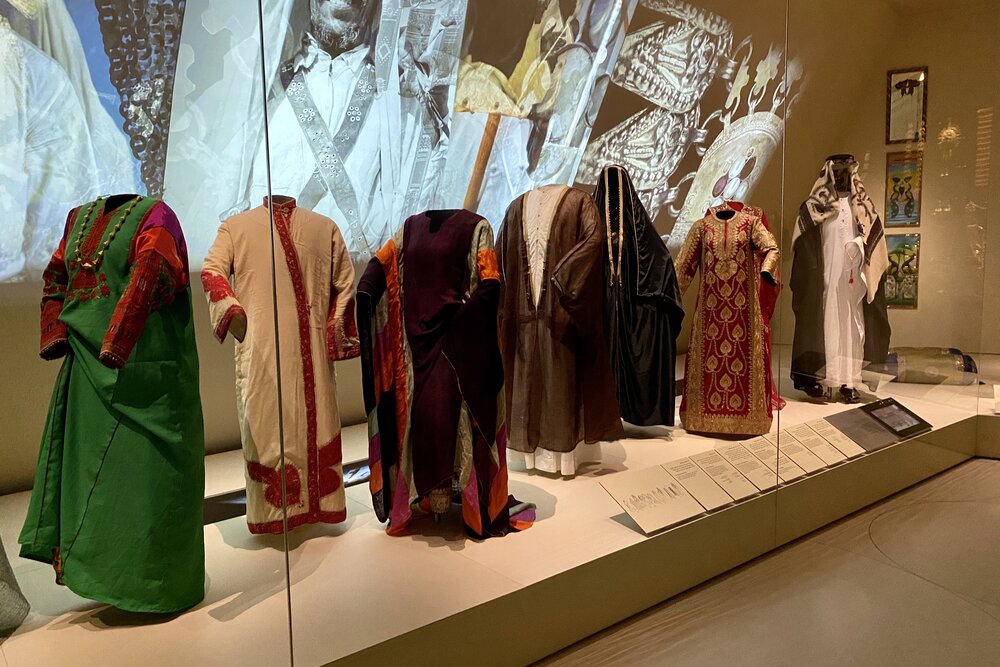
National Museum of Qatar – Exhibits
One exhibit that particularly interested me related to the diplomatic blockade on Qatar led by its fellow Arab nations Saudi Arabia, the United Arab Emirates, Bahrain, and Egypt as part of an ongoing conflict for power and influence in the region.
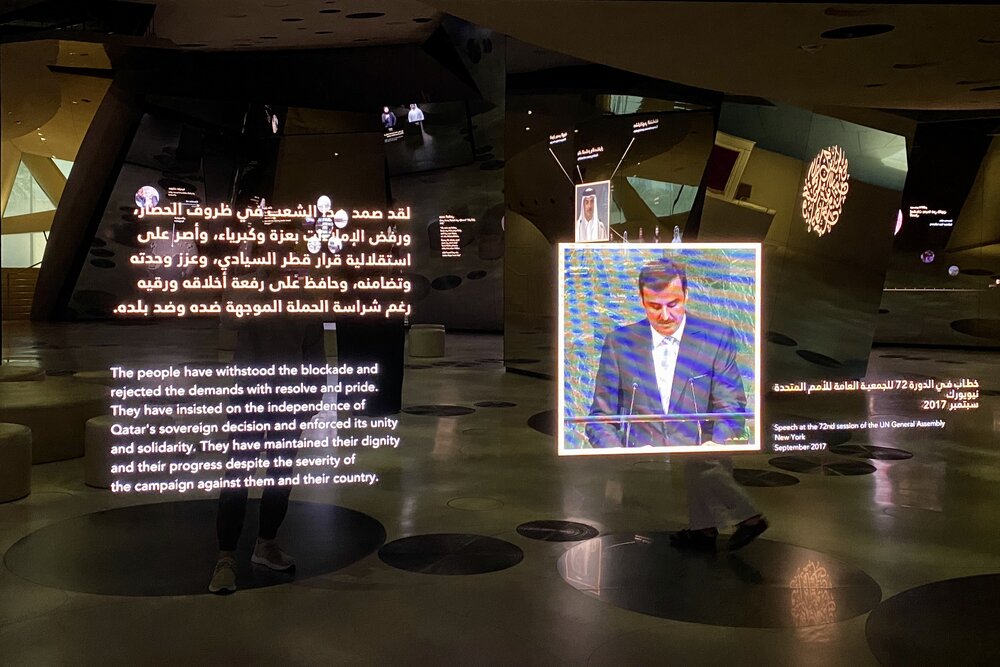
National Museum of Qatar – Exhibits
As you’d expect, the museum’s exhibit riled up plenty of Qatari nationalistic fervour, portraying the nation has hapless victims of the economic embargo and casting the Saudi-led coalition’s accusations of Qatar’s support for terrorist groups as outright lies. The truth, in all likelihood, lies somewhere in between.
Desert Safari & Inland Sea Tour
One activity that’s popular among visitors to Doha who have an extra day to spare is to embark on a desert safari and a visit to the Inland Sea on the south side of Qatar. There are several half-day and full-day tours that you can book online or via your hotel, and after shopping around, I booked a five-hour safari, camel ride, sandboarding, and Inland Sea tour via GetYourGuide for around $80.
(This was one of the only tours I found that was reasonably priced. Many other online tours, as well as the tour that the W Doha’s concierge recommended for me, were around $200 for a half-day, which I thought was way overpriced. Make sure to do some comparison shopping!)
After being picked up from the W and linking up with a few other tourists who were visiting Doha for the day from their cruise ship, we began the hour-long drive into the vast Qatar desert. Our first stop was a Bedouin tent where we were invited to have some tea, after which we each got to ride a camel around the desert for about 10 minutes.
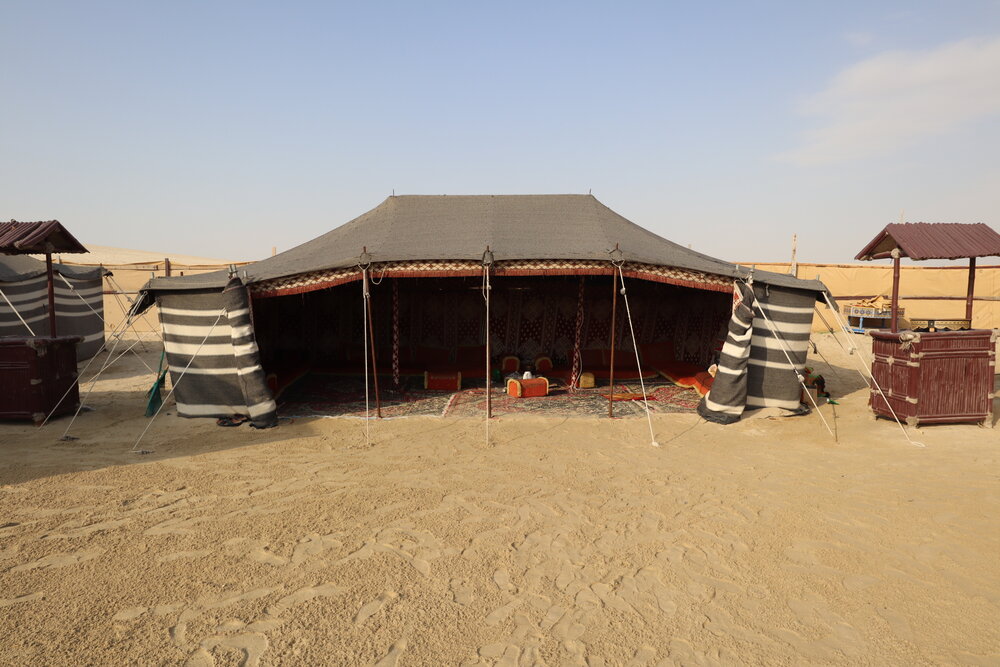
Desert safari & Inland Sea tour – Bedouin tent
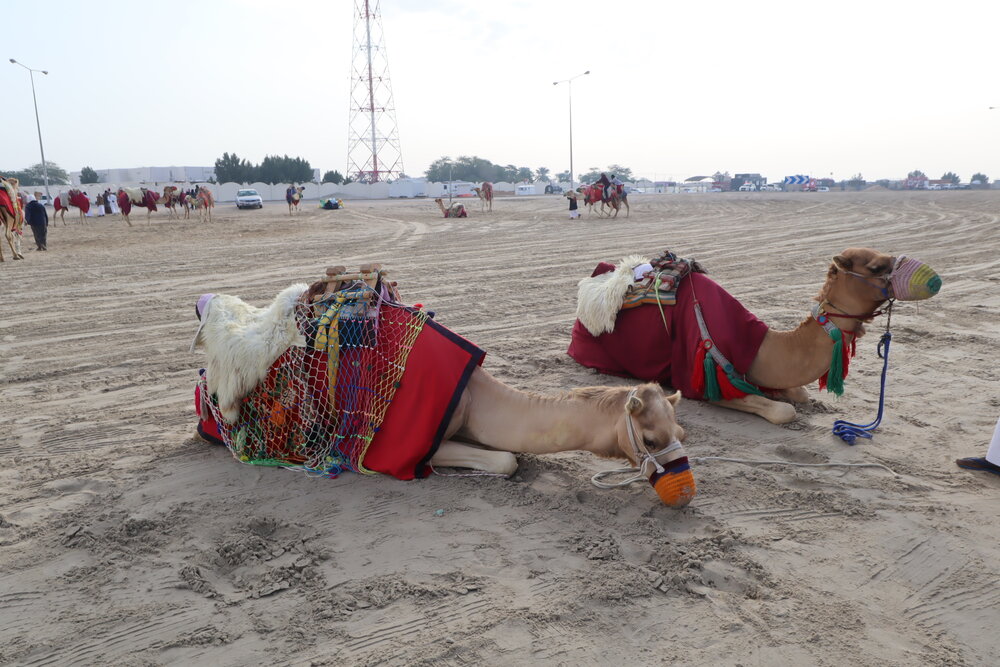
Desert safari & Inland Sea tour – Camel ride
We were also treated to a brief falconry performance, and the handler allowed us to get our photo taken with the falcon (for another 5 QAR tip, of course).
https://www.instagram.com/p/B8CjmrshUJQ/
We were then treated to some dune-bashing in the vehicle on our way to the next stop: a very steep dune within the desert where we got to do some sandboarding. From there, it was another short drive before we reached our southern terminus of the tour: the Inland Sea that separates Qatar from Saudi Arabia on the opposite side.
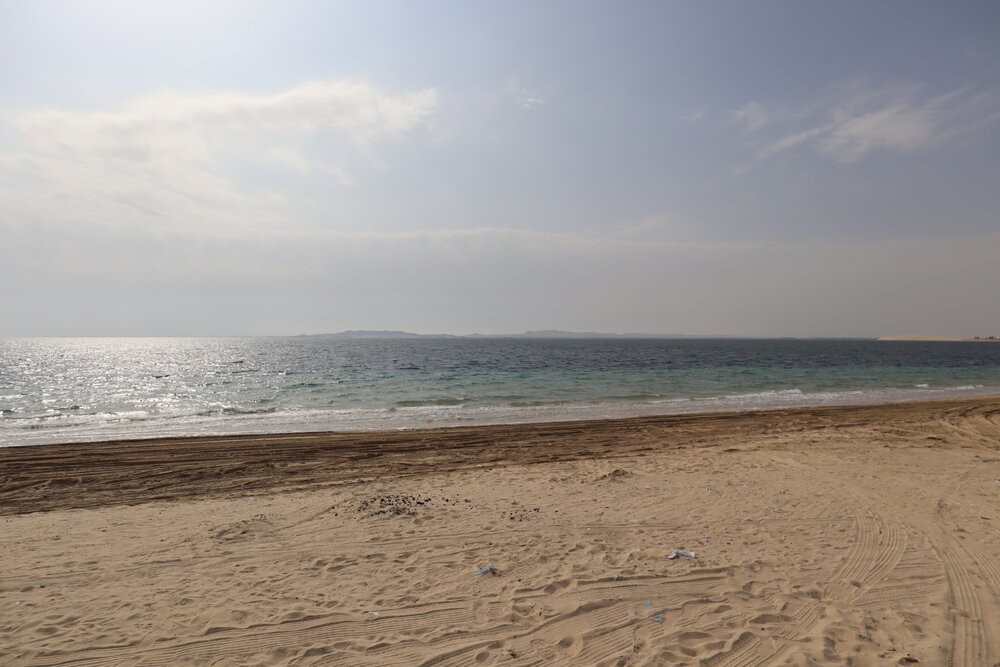
Desert safari & Inland Sea tour – Inland Sea views
If I’m being honest, the desert safari tour felt like a pretty manufactured tourist experience, although perhaps that’s because I already got to do some very similar things during my visit to Dubai (and in particular my stay at Al Maha Desert Resort) last year.
If this were my first time embarking on a desert safari, it probably would’ve been a lot more fun, so I wouldn’t recommend against it if it’s your first trip to the Middle East.
Doha is located smack dab in the middle of the very small nation of Qatar, so having toured its southern desert already, next time I’d imagine that a journey to the ancient forts in the north of the country would be more illuminating.
Other Attractions & Impressions
Based on a guidebook’s recommendation, I also visited the Katara Cultural Village, a centre for film, music, and the arts in Doha. There were quite a few interesting buildings to look at, and I found the outdoor amphitheatre to be a unique Islamic take on the Classical Greek concept, but otherwise there didn’t seem to be too much going on when I passed through.
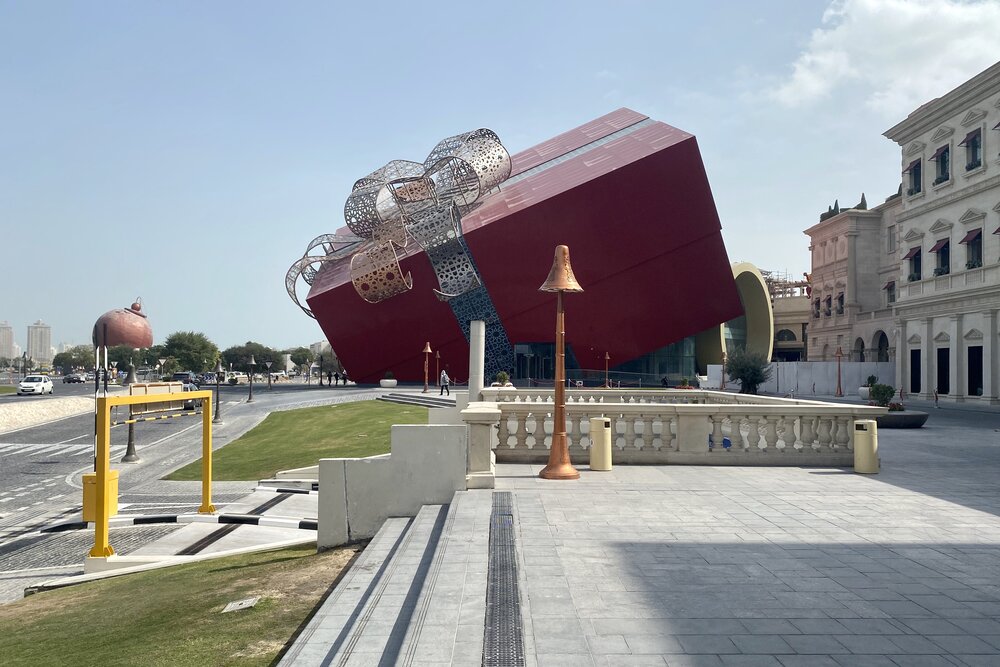
Katara Cultural Village
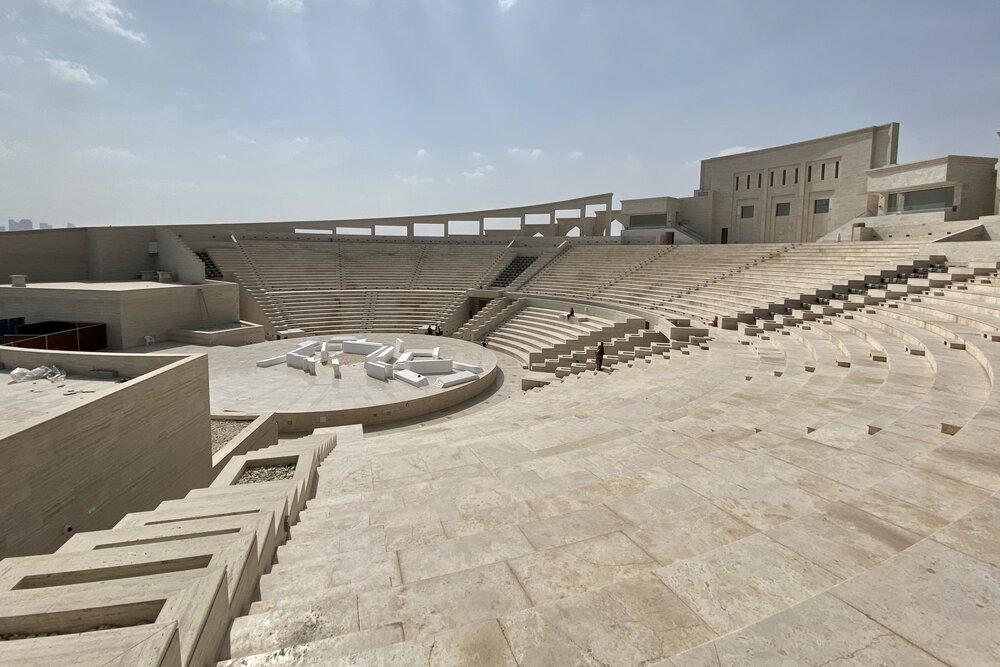
Katara Cultural Village
I also visited quite a few malls and shopping centres during my time in town; similar to its older cousin Dubai, Doha’s malls are glitzy and glamorous, with all of the modern trappings you might need (like indoor ski rinks).
[foogallery id=”16697″]
To get from place to place, the Doha Metro is likewise very easy to navigate, affordably priced (starting at 2 QAR for a one-way ride), and, most importantly, provides air-conditioned shelter from the blazing desert heat. All of the attractions I highlighted can be reached by train, as can Hamad International Airport, your likely port of entry.
Having said that, Uber is also an affordable method of getting around, and may even be preferable when you consider that you’ll still have to walk short distances to get from the metro station to your hotel and most attractions.
Conclusion
Overall, I felt that most of Doha’s attractions can be seen in one or two days’ worth of sightseeing.
Because of its mostly expatriate population and its intense, oil-fuelled focus on rapid modernization, Doha was perhaps a less interesting place to visit compared to many of its peers in the Middle East, such as Jordan (home to the Dead Sea, the ancient ruins of Petra, and the red-rock desert of Wadi Rum) or Oman (home to the storied capital of Muscat and several stunning desert sites).
Even Dubai in the UAE, while of a similar mould, offers more to the visitor, as it’s perhaps further along the path of developing into a metropolis of global significance thanks to billions of barrels of oil.
Then again, it’s not often that you get to witness a new global city springing up from the ground, and Doha is only gathering pace as it follows that journey forward. The 2022 FIFA World Cup should attract a huge number of tourists, and I’m sure there will be many new and exciting things to see in Doha when the time comes.
Until then, I wouldn’t say that Doha and Qatar should be the top item on your Middle East bucket list, but it’s certainly worth a day or two as part of a larger Middle Eastern trip, or perhaps a long layover or a stopover when transiting through Doha on a Qatar Airways flight.




















Ricky, great review as always but as an avid traveler and blogger it’s expected that you have your facts straight in the article when referring to the Persian Gulf.
Thanks for your feedback. It’s a nuanced situation for sure and I don’t claim to have beyond a high-level understanding, so I’d welcome any corrections or additions.
Would you care to elaborate?
Nice article and I’ll be sure to check out a few of your recommendations when I visit Doha next year. Based on your feedback, I’ll skip the desert safari tour since I also recently had the opportunity to stay at Al Maha for 5 nights (best points redemption ever at 60k/night). Although Doha seems quite interesting, I’m considering spending significantly more time in Oman since I’ve heard that it has a lot more to offer culturally and is less glitz and glam compared to Doha or Dubai. Interestingly, direct flights operate between Doha and Muscat which is convenient for travelers wanting to visit another nearby country in the region while avoiding travel restrictions due to economic embargo on Qatar.